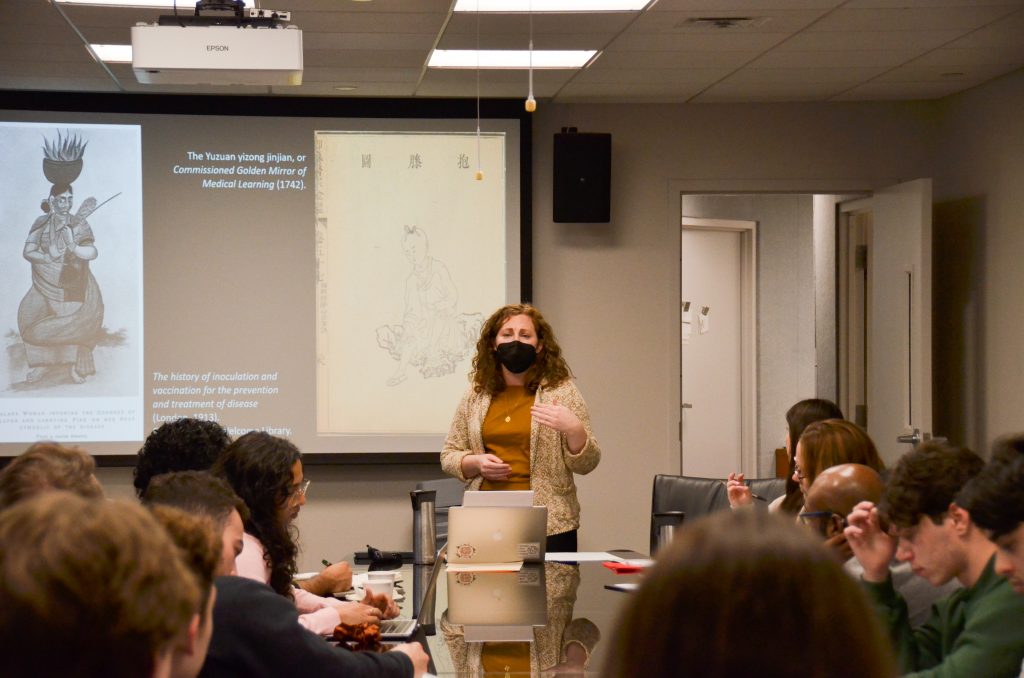Binghamton University faculty and students gathered to attend the Human Rights Institute’s (HRI) “Atlantic Antidote: Race, Gender and the Birth of the First Vaccine” research talk on Thursday.
Held in the HRI’s office in Academic A, Farren Yero, the Turovsky/Casey Family Postdoctoral Fellow in Latin American History, discussed the social, political and gender dynamics surrounding the smallpox vaccine’s arrival in Latin America. Throughout the presentation, Yero supplemented her research with primary sources, including letters from doctors and magistrates, as well as vaccination logs. Cosponsoring the event with HRI were the History Department and the Citizenship, Rights and Cultural Belonging Transdisciplinary Area of Excellence (TAE). Yero’s upcoming book served as the basis for the lecture and shares its name.
“The book brings together historical research and feminist theories of labor to make visible the role and experiences of free and enslaved women and their children during the first smallpox vaccination campaigns in 19th-century Mexico and the Spanish Caribbean,” Yero wrote in an email.
During the presentation, Yero announced her plans to develop a digital humanities database for primary sources focusing on 19th-century materials. Modeled after CUNY’s document collection, Yero plans to create a website with her students in “Health and Society in Latin America and the Caribbean,” a class she will teach in fall 2024. This website would also permanently host “Vaccine Voyages,” an exhibit based on Yero’s research.
The research talk began with introductions by Alexandra Moore, the director of the HRI, cochair of the Citizenship, Rights and Cultural Belonging TAE and a professor of English. Moore announced that Yero will work with the Spatial Humanities Working Group, an interdisciplinary group of faculty and graduate students that develops scholarly resources for digital humanities research.
The presentation centered around two case studies from the first vaccination campaigns in Latin America under the Spanish Empire’s rule. In the first case study, Yero discussed the Spanish policy of requiring parental consent for vaccination and how this law was unequally enacted based on racial and economic lines. She highlighted an incident where 12 Indigenous children were forcefully taken to an orphanage — used as a vaccination testing site — against their parents’ will.
Under Spanish law, children deemed vagrants — often impoverished or racial minorities — could be taken by clergymen and placed into orphanages. According to Yero, children were “critical medical resources” when developing the smallpox vaccine because they could be reliably inoculated with the virus and used as smallpox hosts, with their scabs harvested to be used for the vaccine.
She presented letters from local officials and magistrates to argue that they believed elite Spanish women had reason to be suspicious of the smallpox vaccine, while indigenous mothers were considered ignorant and apathetic to their children for resisting inoculation. Yero recounted how enslaved people often had their children forcefully taken from them and used to test vaccines.
“Effectively, some people had additional rights as parents, where some people were dispossessed of their children as [sources of vaccines],” Yero said.
In the second case study, Yero analyzed an 1817 letter from a governor in Acayucan, Mexico, who complained about indigenous mothers fleeing into the mountains to prevent their children from being vaccinated. Yero said that it demonstrated how mothers understood public health policy and consent during this time, and she noted that many parents still chose to vaccinate their children, using vaccination records written in both Spanish and Maya.
Utilizing the case studies, which laid the groundwork for her upcoming book, Yero highlighted the racial and gender dynamics of Latin America under the Spanish Empire and the lessons that current public health institutions could learn from these sources.
“Effective public health requires trust, but also requires equity,” Yero said.



